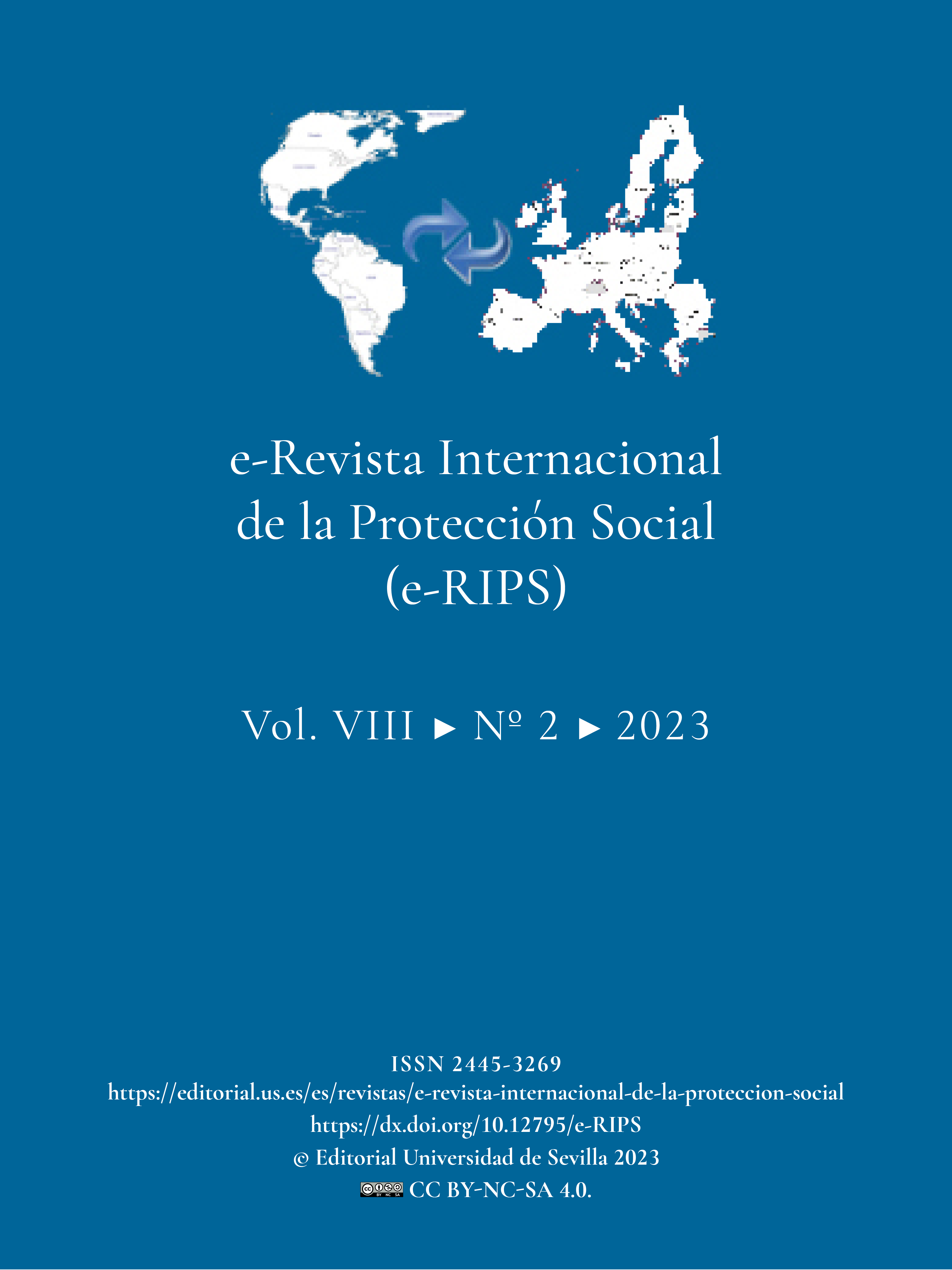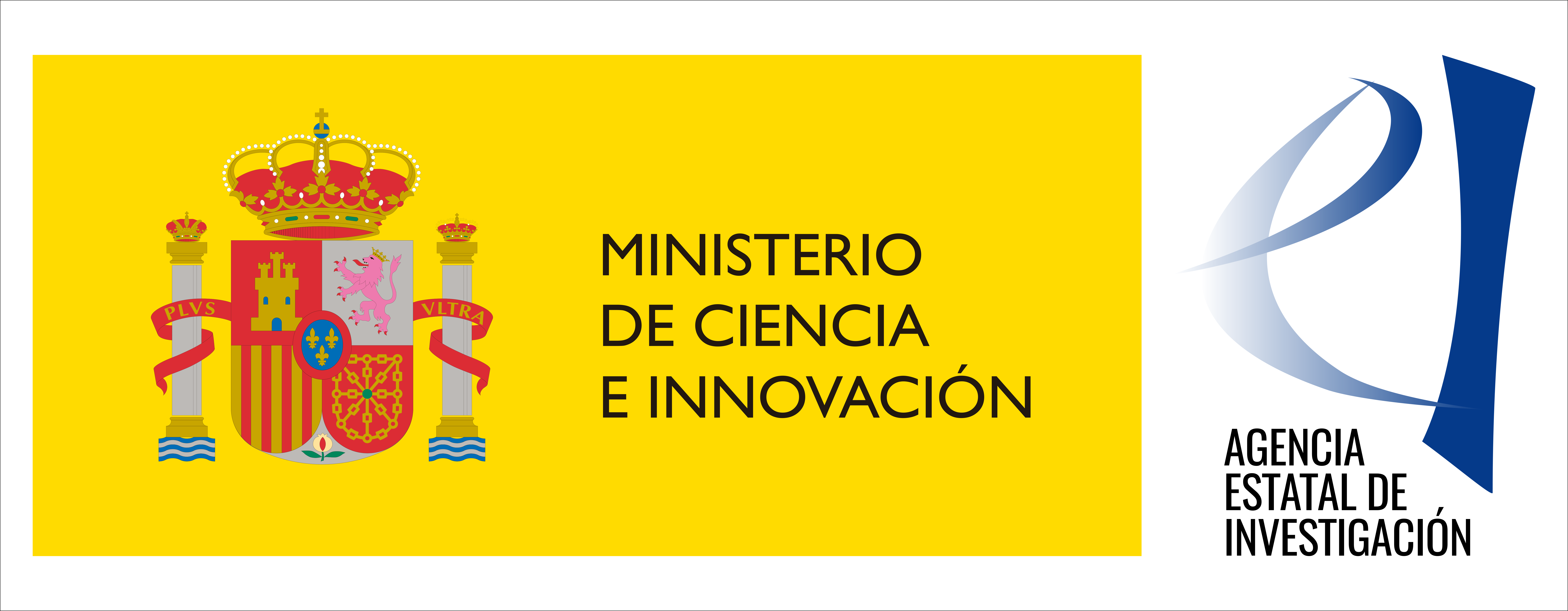A trinca de um cenário positivo à saúde laboral: nanotecnologias, produtividade e trabalhabilidade
DOI:
https://doi.org/10.12795/e-RIPS.2023.i02.09Palabras clave:
Nanotecnologias, Produtividade , TrabalhabilidadeResumen
O estudo é movido pelo desafio de investigar as modernas inquietações do mundo do trabalho. Para tanto, além de destinar atenção especial ao labor produtivo, busca-se verificar se dentro deste quadro as nanotecnologias podem auxiliar a labuta, não desatentando aos pormenores que envolvem a preocupação (que se deve ter e manter) com a saúde. Desta feita, almeja-se responder a seguinte questão: De que forma a utilização de nanotecnologias podem incentivar a produtividade laboral sem violar o direito à saúde assegurado pela Constituição Cidadã de 1998? A pesquisa seguirá o método de abordagem hipotético-dedutivo, em virtude da forma que se pretende cotejar a sua resposta, experienciando as nanotecnologias em cenário laborativo, construindo prováveis conjecturas ao problema e lançando novas possibilidades. Os procedimentos serão histórico-tipológico-funcionalistas, considerando que se fará reflexão em apanhado teórico-cronológico e posterior ilações frente às (novas) composições sociais. Manuseando materiais bibliográficos existentes em pesquisa de tipo qualitativo, a interpretação que se pretende perquirir é sociológica, a julgar pelo moderno cenário social e prospecto futuro ao labor arrimado por incrementos em nanodimensões. Por derradeiro, conclui-se que, se o exercício laboral for jungido pelo princípio da precaução quando do manuseio de produtos em escala nanotecnológica, a saúde do trabalhador será salvaguardada, assim como será possível o desenvolvimento de sua produtividade se, em paralelo, incentivada for a sua trabalhabilidade.
Descargas
Citas
Agência Brasileira de Desenvolvimento Industrial (ABDI): Cartilha sobre nanotecnologia, ABDI, Brasília, 2010. Disponível em: http:/livroaberto.ibict.br/handle/1/572.
Alves, A.M.: A Trabalhabilidade como direito social fundamental: O critério da ponderação como alternativa à sua realização, Livraria do Advogado, Porto Alegre, 2023.
Brasil. [Constituição (1988)]. Constituição da República Federativa do Brasil de 1988. Disponível em: http://www.planalto.gov.br/ccivil_03/constituicao/constituicaocompilado.htm. Acesso em: 3 mai. 2023.
Brasil. Exposição de Motivos da Consolidação das Leis do Trabalho. Rio de Janeiro, 19 abr. 1943, p.6. Disponível em: https://juslaboris.tst.jus.br/bitstream/handle/20.500.12178/29280/1943_clt_exposicao_motivo.pdf?sequence=1&isAllowed=y. Acesso em: 01 mai. 2023.
Brasil. Projeto de Lei. Institui o Marco Legal da Nanotecnologia e Materiais Avançados; dispõe sobre estímulos ao desenvolvimento científico, à pesquisa, à capacitação científica e tecnológica e à inovação nanotecnológica; altera as Leis nº 10.973, de 2 de dezembro de 2004, e nº 8.666, de 21 de junho de 1993; e dá outras providências. Disponível em: https://legis.senado.leg.br/sdleg-getter/documento?dm=7918785&ts=1681743981344&disposition=inline&_gl=1*dn8cq9*_ga*MzcxMzY2ODQ5LjE2NTEyNjIxMTQ.*_ga_CW3ZH25XMK*MTY4NjEyNjgyMC40LjEuMTY4NjEyNzE0NS4wLjAuMA. Acesso em: 01 mai. 2023.
Brasil. Seção Especializada em Dissídio Coletivo. Desembargador Relator: Francisco Ferreira Jorge Neto. Tribunal Regional do Trabalho da 2ª Região. Processo nº 1000962-97.2018.5.02.0000, 2018.
Castells, M.: A sociedade em Rede. A Era da Informação: Economia, Sociedade e Cultura, Paz e Terra, São Paulo, 1996.
Centro de Memórias Anamt: “VIII FÓRUM - Conferência Nanotecnologia”, Vídeo de Youtube, 45:55. Publicado em 6 de novembro de 2017. Disponível em: https://www.youtube.com/watch?v=4LjeK72eve4. Acesso em 03 mai. 2023.
Custódio, A.; Pinto, A.G.V.: Nanotecnologia: O Transporte para um novo universo, Fundacentro, São Paulo, 2008. Disponível em: http://arquivosbiblioteca.fundacentro.gov.br/exlibris/aleph/a23_1/apache_media/AQ6TK25H1JP7FKN48T3P3A8CP2BV7Q.pdf.
Delgado, M.G.: Curso de Direito do Trabalho, LTr, São Paulo, 2019.
Engelmann, W.; Hohendorff, R.: “Nanotecnologias e o mundo do trabalho: Em busca de um “modelo” para o desenvolvimento do direito à informação compatível com o direito do trabalho nanotecnológico”. Publica Direito. 2014. Disponível em: http://www.publicadireito.com.br/artigos/?cod=a56b6ea9b986428c. Acesso em: 03 mai. 2023.
Feynman, R.: “There’s Plenty of Room at the Bottom. No invitation to enter new field of physics”, Engineering and Science (Caltech), Vol. 23, num. 5, 1960, pp. 22-36. Disponível em: http://calteches.library.caltech.edu/47/2/1960Bottom.pdf. Acesso em: 01 mai. 2023.
Fincato, D.P.; Alves, A.M.: “Produtividade no Trabalho Em Plataformas Digitais e a Trabalhabilidade como Fenômeno Social”, in Veiga, F.S.; Załucki, M. (Coords.): LegalTech, Artificial Intelligence and the Future of Legal Practice, Instituto Iberoamericano de Estudos Jurídicos and AFM Kraków University, Porto/Kraków, 2022, pp. 75-83.
Fincato, D.P.; Alves, A.M.: “Trabalhabilidade como bússola orientadora ao topo da pirâmide de Maslow”, Revista Científica Multidisciplinar Núcleo do Conhecimento, Ano. 07, Ed. 08, Vol. 05, pp. 54-65. DOI: 10.32749/nucleodoconhecimento.com.br/ciencias-sociais/piramide-de-maslow
Fincato, D.: “Trabalhabilidade (workability):um direito ‘VUCA’”, O Estadão, blog do Fausto Macedo, 28 de julho de 2020. Disponível em: https://politica.estadao.com.br/blogs/fausto-macedo/trabalhabilidade-workability-um-direito-vuca/. Acesso em: 01 mai. 2023.
Freitas, J.: A interpretação Sistemática do Direito, Malheiros, São Paulo, 2010.
Nascimento, A.M.: Curso de Direito do Trabalho, Saraiva, São Paulo, 2013.
Góes, M.C.: “As nanotecnologias e o mundo do trabalho: a preocupação com uma nova realidade à luz da dignidade do trabalhador”, Justiça do trabalho, Porto Alegre, ano 30, num. 352, 2013, pp. 21-49.
Góes, M.C.; Engelmann, W.: Direito das Nanotecnologias e o Meio Ambiente do Trabalho, Livraria do Advogado, Porto Alegre, 2015.
Governo Federal. Fundacentro. Disponível em: https://www.gov.br/fundacentro/pt-br. Acesso em: 03 mai. 2023.
Hahendorff, R.; Engelmann, W.; Oshiro, M.L.: “As nanotecnologias no meio ambiente do trabalho: a precaução para equacionar os riscos do trabalhador”, Cadernos Ibero-Americanos de Direito Sanitário, Vol. 2, num. 2, 2013, pp. 668-683. DOI: https://doi.org/10.17566/ciads.v2i2.114
ISO/TC 229. Nanotechnologies. Technical Committees. Disponível em: https://www.iso.org/committee/381983.html. Acesso em 03 mai. 2023.
Leite, L.P.: “Saúde e segurança do trabalho na indústria 4.0: nanotecnologia, o futuro presente”, SESI. Disponível em: https://www.sesi-ce.org.br/blog/saude-e-seguranca-do-trabalho-na-industria-4-0-nanotecnologia-o-futuro-presente/. Acesso em: 03 mai. 2023.
Museu Virtual de Nanociência e Nanotecnologia: “Biografia - Norio Taniguchi”. Disponível em: https://www.maxwell.vrac.puc-rio.br/20185/historia_taniguchi.html. Acesso em 03 mai. 2023.
Naden, C.: “The science of tiny little things”, ISO.org., 1 abr. 2021. Disponível em: https://www.iso.org/news/ref2649.html. Acesso em: 03 mai. 2023.
National Nanotechnology Initiative: “Working at the Nanoscale”. Disponível em: https://www.nano.gov/about-nanotechnology/working-at-nanoscale. Acesso em 01 mai. 2023.
OIT: Organização Internacional do Trabalho. Futuro do Trabalho no Brasil: Perspectivas e Diálogos Tripartites, 2018.
Roda Viva: “Pierre Lévy. 08/01/2001”, Vídeo de Youtube, 1:30:10. Publicado em 28 de marzo de 2016. Disponível em: https://www.youtube.com/watch?v=DzfKr2nUj8k. Acesso em: 01 mai. 2023.
Schwab, K.: A quarta revolução industrial. Tradução: Daniel Moreira Miranda. Edipro, São Paulo, 2016.
Sarlet, G.; Ruaro, R.: “A proteção de dados sensíveis no sistema normativo brasileiro sob o enfoque da lei geral de proteção de dados (LGPD)”, Revista Direitos Fundamentais & Democracia, Vol. 26, num. 2, 2021, pp. 81-106. DOI: https://doi.org/10.25192/issn.1982-0496.rdfd.v26i22172
Sarlet, I.W.: A Eficácia dos Direitos Fundamentais: Uma teoria geral dos Direitos Fundamentais na perspectiva da constitucional, Livraria do Advogado, Porto Alegre, 2018.
Sarlet, I.W.; Marinoni, L.G.; Mitidiero, D.: Curso de Direito Constitucional, Saraiva Educação, São Paulo, 2020.
Schulz, P.: “Há mais história lá embaixo: Um convite para rever uma palestra”, Revista Brasileira de Ensino de Física, Vol. 40, num. 4 (Seção especial - Celebrando os 100 anos de nascimento de Richard P. Feynman), Vol. 40, 2018. DOI: https://doi.org/10.1590/1806-9126-RBEF-2017-0375
Silva, V.A.: Direitos Fundamentais: conteúdo essencial, restrições e eficácia, Malheiros, São Paulo, 2010.
Sleep Social 00: “Norio Taniguchi”, Vídeo de Youtube, 0:50. Publicado em 29 setembro de 2021. Disponível em: https://www.youtube.com/watch?v=4y06Sqj2OtE. Acesso em: 03 mai. 2023.
Stürmer, G.: Direito Constitucional do Trabalho no Brasil, Atlas, São Paulo, 2014.
Verve Científica: “Richard Feynman, o Pai da Nanotecnologia”, Vídeo de Youtube, 3:34. Publicado em 14 de julho de 2020. Disponível em: https://www.youtube.com/watch?v=B-x0pZfPLTE. Acesso: em 1 mai. 2023.
Publicado
Cómo citar
Número
Sección
Licencia
Derechos de autor 2023 Maurício de Carvalho Góes, Andressa Munaro Alves

Esta obra está bajo una licencia internacional Creative Commons Atribución-NoComercial-CompartirIgual 4.0.
e-Revista Internacional de la Protección Social es una revista de acceso abierto, lo que significa que todo su contenido está disponible gratuitamente para el usuario o su institución. Los usuarios pueden leer, descargar, copiar, distribuir, imprimir, buscar o enlazar con el texto completo de los artículos, o utilizarlos para cualquier otro fin lícito, sin solicitar permiso previo al editor o al autor. Esta definición de acceso abierto se ajusta a la Iniciativa de Acceso Abierto de Budapest (BOAI).
 4.0
4.0
A menos que se indique lo contrario, todo el contenido de la edición electrónica se distribuye bajo una " licencia internacional Creative Commons Atribución-Nocomercial-Compartirigual 4.0 Internacional". Puede consultar la versión informativa y el texto legal de la licencia aquí. Esto debe indicarse expresamente de esta manera cuando sea necesario.
En caso de aceptación del manuscrito, los autores ceden los derechos de la obra para su publicación a eRIPS. Revista Internacional de la Protección Social bajo el contrato de licencia Reconocimiento-NoComercial-CompartirIgual 4.0 Internacional (CC BY-NC-SA 4.0). Los autores conservan los derechos de autor y terceros están autorizados a compartir y adaptar la obra, siempre que cumplan con los términos y condiciones establecidos en la licencia.
- Usted debe dar crédito de manera adecuada , brindar un enlace a la licencia, e indicar si se han realizado cambios . Puede hacerlo en cualquier forma razonable, pero no de forma tal que sugiera que usted o su uso tienen el apoyo de la licenciante.
- Usted no puede hacer uso del material con propósitos comerciales .
- Si remezcla, transforma o crea a partir del material, debe publicar sus contribuciones bajo la misma licencia que el original.
Se puede encontrar más información en https://creativecommons.org/licenses/by-nc-sa/4.0/deed.es
Se permite y recomienda a los autores/as difundir su obra a través de Internet (p. ej.: en archivos telemáticos institucionales o en su página web) antes y durante el proceso de envío, lo cual puede producir intercambios interesantes y aumentar las citas de la obra publicada.











